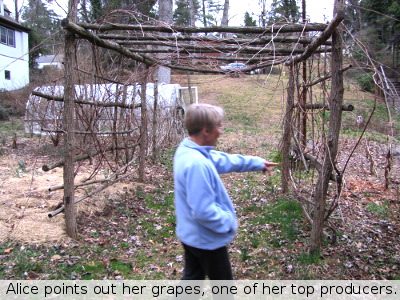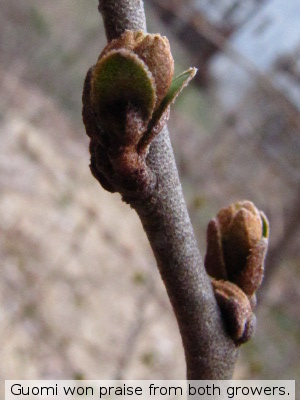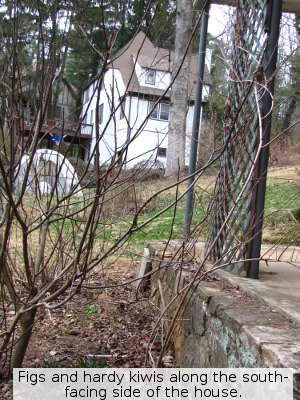
Best trees and shrubs for an Appalachian forest garden
 Five
years ago, Alice and Dudley started putting in edible perennials
in their large backyard, at the same time that their neighbor Robert
did the
same. Walking through their gardens was a bit like reading
through those catalogs I drool over, full of fruits I'd heard of but
had never seen in the flesh, like goumi, jujube, and more. Other
unusual plants were familiar from my own garden, where they haven't had
time to achieve
their full potential. Since most of Alice, Dudley, and Robert's
perennials were old enough to fruit, I was
Five
years ago, Alice and Dudley started putting in edible perennials
in their large backyard, at the same time that their neighbor Robert
did the
same. Walking through their gardens was a bit like reading
through those catalogs I drool over, full of fruits I'd heard of but
had never seen in the flesh, like goumi, jujube, and more. Other
unusual plants were familiar from my own garden, where they haven't had
time to achieve
their full potential. Since most of Alice, Dudley, and Robert's
perennials were old enough to fruit, I was  curious to see which ones
had been exciting (or disappointing) surprises in a climate much like
my own.
curious to see which ones
had been exciting (or disappointing) surprises in a climate much like
my own.
First for the big
disappointment. Both Alice and Robert told me
that their gojiberries never fruited. In our climate, the variety
they planted (and which I have in my own garden, a gift from Alice)
blooms so late that the fruits never have time to form.
Meanwhile, the thorny shrub takes over the garden. Robert has
plans to root out his gojiberries this year, and after hearing their
experiences, I think I'm not going to give mine the extra grace year
I'd promised it and will follow suit. There's no room in a
working garden for an underachiever.
Alice was also somewhat
disappointed in her bush cherries, noting that
the fruits were small and seedy, so they were tough to pit for
cooking. Robert mentioned that his jujube hadn't produced fruit
in five years. And Alice's jostaberry hasn't fruited in that time
 frame
either, although she mentions that the problem could be shade.
Other non-fruiters included Rosa
rugosa, Japanese
walnut (although nuts take longer and this plant still has hope), hardy
kiwi, plum yew, and
paw-paw.
frame
either, although she mentions that the problem could be shade.
Other non-fruiters included Rosa
rugosa, Japanese
walnut (although nuts take longer and this plant still has hope), hardy
kiwi, plum yew, and
paw-paw.
Meanwhile, I
picked the gardeners' brains about their top perennials
--- ones that produce delicious fruit with little work.
Traditional fruits were at the top of each list --- ever-bearing
red-raspberries and thornless blackberries for Alice and a peach and
Asian pear for Robert. But so were some less usual fruits ---
both agreed that their Asian
persimmon (Eureka)
and goumi were tops for
flavor and ease. It sounds like I might need to add some of both
in our own garden.
| This post is part of our Real Forest Gardening lunchtime series.
Read all of the entries: |
Want more in-depth information? Browse through our books.
Or explore more posts by date or by subject.
About us: Anna Hess and Mark Hamilton spent over a decade living self-sufficiently in the mountains of Virginia before moving north to start over from scratch in the foothills of Ohio. They've experimented with permaculture, no-till gardening, trailersteading, home-based microbusinesses and much more, writing about their adventures in both blogs and books.
Want to be notified when new comments are posted on this page? Click on the RSS button after you add a comment to subscribe to the comment feed, or simply check the box beside "email replies to me" while writing your comment.

I have a goumi planted under my paulownia tree here. Every year we get a slew of fruit, even though we give the tree absolutely no attention the other 11 months of the year. We use it to make Goumi liqueur
And our Persimmons- we have an enormous Hachiya astringent persimmon tree that gives us hundreds of fruit each year- when we can reach them! I love to dry them and have them with tea. But when we are too late picking them and they get gooey and soft, you can't beat persimmon bread.
I've had a goumi on my todo list for a couple years now -- ever since an Organic Growers School Class on oddball fruit (Chuck Marsh from Useful Plants).
Got those raspberries & blackberries in the ground today, THANK YOU! I'm so excited about them.
I'm so excited about them.
I'm pretty sure that Chuck Marsh is the one who tempted both Alice and Robert to get guomis too. I almost picked one up at the Grower's School, but they'd already sold out!
You're very welcome! I hope the brambles produce as well for you as they do for us!